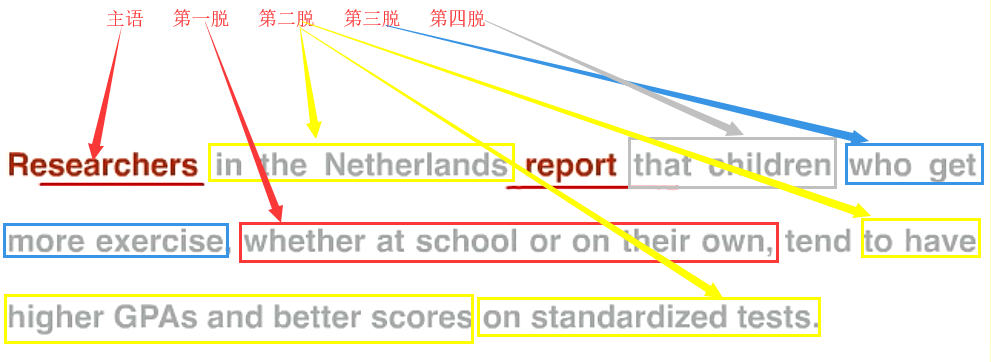从句
1.为什么要学从句?
- 可以帮助在写作和翻译时做到游刃有余,加快阅读速度;
- 当我们修饰一个人或物时,如果只有一个形容词有时会显得太过乏力;
- 当简单句中的6个成分要用句子扮演时,就有了从句;
2.从句连词
主从句之间如何连接?| 使用从句的连接词;
从句连词
- 1.别丢了;
- 2.当脑袋(放在从句的左边)
学从句就是学连词;
3.从句分为:
- 主角从句;
- 定语从句;
- 同位语从句;
主角从句(主宾表)
主角从句--->主/宾/表语从句,删去则主句不完整。
主角从句连词
配角连词
- that,无语义,不起作用;
- whether,连接从句的同时起“是否”的含义;
- whether和if一般不能替换,为了避免出错,当需要用"是否"连接从句时可以只用whether;
1. that
The fact is that you are right.
我特点相信:你爱我。
I do believe that you love me.
问题是:你错了。
The problem is that you are wrong.
2. whether/if
The problem is whether you are right. // 表语从句
我不知道:你是否爱我。
I don't know whether you love me. // 宾语从句
3. whether/if 辨析
主语从句位于句首:不用if; If we need is it a different matter. //错误 宾语从句中有 or not:不用if; It doesn't matter if she will come or not. //错误 表语从句:不用if; The problem is if we need it. //错误 不定式:不用if; I don't know if to go or not. //错误
主角连词
- 缺主语用who,缺宾语用whom;
- 从句里缺东西,统一用what;
- 从句里缺时间地点原因,用when/where/why;
1. who/whom:缺人
Who laughs last laughs best. // 主语从句
Whom i trust is you. // 主语从句
爱我的人:是你。
Who loves me is you. // Sb loves me is you. sb在这里做主语,用who的主语形式
我爱的人:是你。
Whom i love is you. // I love whom is you. sb在这里做宾语,用who的宾语形式
缺主语用who,缺宾语用whom;
2. what:缺物
What i love is music. // i love what is music.
3. when / where / why / how:缺状语
I forget where i met you. // 宾语从句
告诉我:你为什么爱他?
Tell me why you love him.
主语从句
Who dares wins. // 勇者胜。
不会翻译的时候,将连接词还原回从句,从左往右,顺着翻。
that 主语从句
一句话做主语,那么这句话就是主语从句。
- 有的时候看句子,不是一个名词作主语,也不是一个代词做主语,根据意思判断是一句话做主语,那么这句话就是主语从句。
- that引导的主语从句是不缺东西的,但因为如果将that去掉,整句话就会出现一个以上的动词,所以不能去掉that;
1.置于句首
That you will pass the CET is an undoubeted fact.
2.置于句末
It's clear that he is a college student.
你掌握语法是可能的
It's possible that you master grammer.
you master program is possible. //错误的 that you master is possible. //80分翻译 It is possible that you master grammer. //标准翻译
3.置于句末(被动式)
it's reported/believed that...
据报道,今年中国快递服务将递送大约120亿件包裹。
It's reported that this year, China's courier service will deliver approximately 12 billion packages.
众所周知,眼见为实。 // 眼见为实是众所周知的。
seeing is believing is well known. // 错误
that seeing is believing is well known.
It is well known that seeing is believing.
以上,that从句,常用于翻译写作,功能句,
要求:写作翻译题时能有意识的利用;
以下,会翻译或者读懂即可,不用会写。
宾语从句
1.在及物动词后作宾语(that可省)
I learned that love, no time, heals all wounds.
I believe what you believe. // I believe (you believe what ).
2.在介词后做宾语
We are in agreement with what you say. // We are in agreement with (you say what).
表语从句
表语:置于系动词(be)之后,解释,描述主语。
Loving is watching films with you. // 是主系表结构,但不是表语从句,只是简单句。
You are what you repeatedly do. // You are (you repeatedly do what).
问题在于你是否真的爱我。
The problem is whether you love me.
This is what i've alaways wanted to talk to you: xxx. // This is (i've alaways wanted to talk what to you: xxx).
定语从句
- 定语修饰名词,定语从句也修饰名词;
- 定语从句永远放在它修饰的名词后面;
- 定语从句删去不影响主句完整;
长的定语放后面
定语从句连词
1.who/whom 修饰人
I love the girl who is a artist.
2.which/that 修饰物
I love Sichuan Cuisine which/that you recommend.
只能用that的情况:
- 1.先行词为不定代词 everything/all/nothing 等;
- 2.先行词被all/no/only/just等强调;
- 3.先行词为数字,序数词,最高级;
- 4.先行词包含人或物;
- 5.先行词在从句中做表语;
不定代词:不确定具体某人某物的代词;
示例:听说你谈恋爱了? 谁说的,不知道谁说的。
只能用which的情况:
- 1.引导非限;
- 2.介词+which;
- 3.前有that定从;
- 4.先行词为that;
当定语从句修饰的不是一个人,不是一个物,而是一句话的时候,就是非限定从,连接词只能用which;
eg:I love the girl, which is true;
3.which 修饰句子
I love the girl, which is true. // 我喜欢这个女孩,是真的。
I love the girl who is beaytiful. // 我喜欢这个漂亮的女孩。 // 定语从句,修饰人,不是修饰句子
非限定从与听力考试
如果听力中出现了非限定从,那么非限定从那句话就是重点;非限定从前面一个时间,后面出现一个时间,那么就选后面的那个时间。

非限定从与写译
中国的经济正快速发展,这让汉语在全世界范围内很受欢迎;
economy is developing, which makes Chinese popular.
Never do anything that cannot be on the front page.
Suggested admission: The amount you pay is up to you. // Suggested admission: The amount (that you pay) is up to you.
状语从句
- 时间 when while as after before until
- 地点 where
- 原因 because for as since
- 目的 (so) that ; in order that
- 结果 so...that...
- 条件 if
- 让步 while although
- 方式 When in rome, do as the Romans do.
状语从句比较简单,不细讲;
- 定语=穿什么衣服出门;
- 状语=出门的状态;
同位语从句
同位语放在名词后面,去解释这个名词;
- 完整句,删去不影响主句完整;
同从有很多个连词,但四六级考察的,只需要知道that连接词;
同从特点:
- 1.连接词(只需要)用that;
- 2.从句是完整的;
- 3.同从紧紧地跟在名词后面,他们之间是等于的关系;
I cling to the idea that you are right. // I cling to the idea 我认为
我们得出结论:眼见为实。
We draw a conclusion that seeing is believing.
裸看法
三脱 | 简化长难句,突出句子主干,体改阅读速度
一.脱掉 逗号,破折号内的插入语; 二.脱掉 介词短语以及 to do不定式; 三.脱掉从句 | 连接词(或介词+which)为头,从句内的第二个动词前为尾,掐头去尾;
三.脱掉从句 | 连接词(或介词+which)为头,从句内的第二个动词前为尾,掐头去尾;
脱从句
在连接词前面画一根竖线,在第二个动词画一条竖线,去掉两个竖线中间的; 如果脱从句时,没有第二个动词,就直接将整个从句脱掉;
脱从句语法示例:
content1 | which(引导的从句) content2 v(第一个动词) content3 | v(第二个动词) --->
content1 v(第二个动词)
脱从句示例1:
Everything that has a begin has a end. --->
Everything | that has a begin | has a end. --->
Everything has a end. // 主干
脱从句示例2:
That which does not kill us makes us stronger. --->
That | which does not kill us | makes us stronger. --->
That makes us stronger. // 主干
组合脱:
- 1.脱插入语
- 2.脱介短/to do
- 3.脱从句
(找到主干)脱的时候按照上面的顺序脱,(理解整句)穿的时候按照上面的逆序去理解句子;
裸看法综合示例

裸看法与选词填空
Many patients also ___ better understanding of the illnesses that landed them in the hospital in the first place. --->
Many patients also ___ better understanding of the illnesses that landed them in the hospital in the first place. --->
Many patients also ___ better understanding of the illnesses that landed them in the hospital in the first place. --->
Many patients also ___ better understanding of the illnesses that landed them in the hospital in the first place. --->
Many patients also ___ better understanding of the illnesses | that landed them in the hospital in the first place. // 没有第二个动词,直接划掉整句 --->
Many patients also ___ better understanding。// 主干
由此可见,这里缺一个动词, 根据后面的landed,判断是v-ed形式。